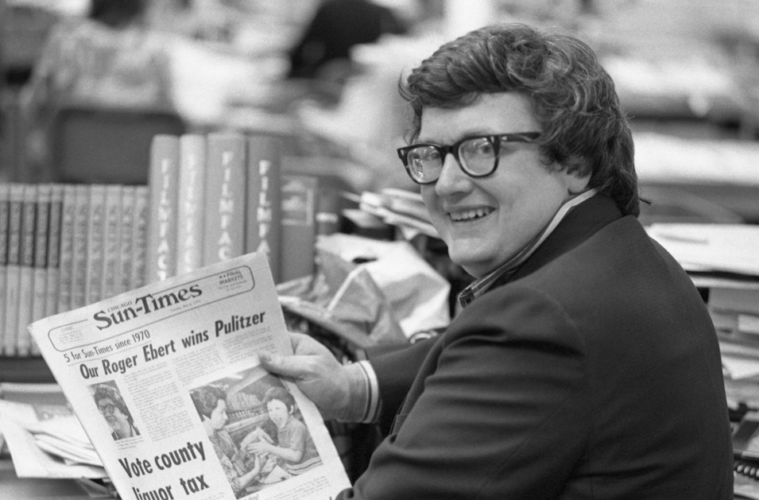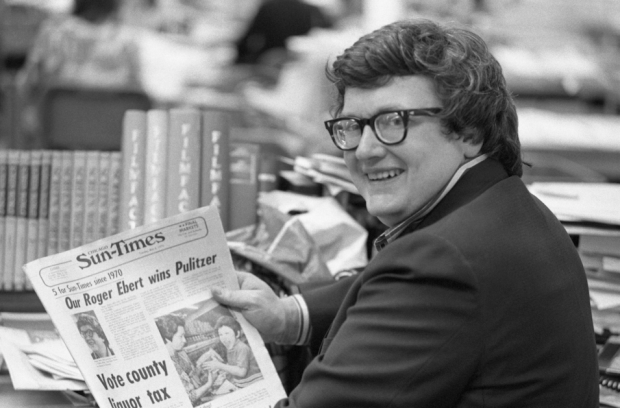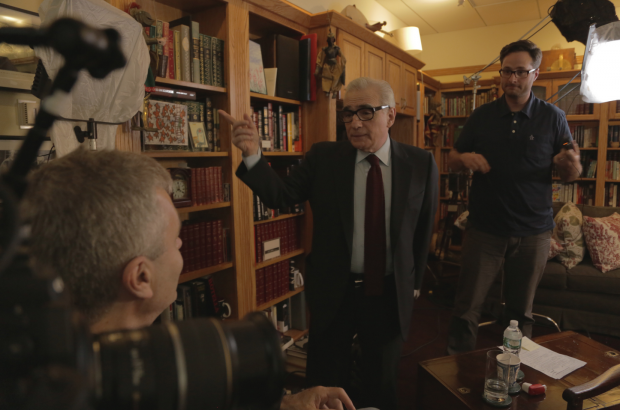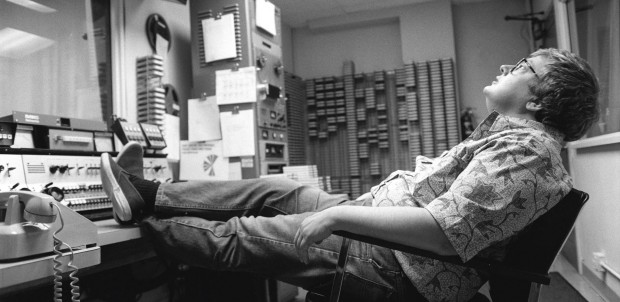Capturing the final, heartbreaking months of Roger Ebert’s life and going into the archive to tell his life’s journey, Steve James has crafted a stunning, balanced documentary that’s a must-see for anyone who loves going to the movies — but, more importantly, discussing them afterward. Upon the theatrical and VOD release of Life Itself I was able to speak with the director about creating the film.
We discusses the critic’s legacy, why it was important for him to tell the story the way he did, Ebert‘s relationship with critics, and if that mirrors James‘ own, being in production when Ebert passed, the new cut premiering at Cannes, Chaz Ebert‘s involvement, and much more. Check out the conversation in full below.
Congrats on the movie. I haven’t seen it Sundance, but it was quite a screening. It was a press screening, so it was all critics. I was curious if you’ve sat in on any screenings where it was just critics and what that reaction has been, perhaps different to regular audiences.
Have I sat in on a screening with critics?
Yeah.
No, I haven’t. There have been some critics in screenings that were general public screenings, but I don’t think I’ve been anywhere where they encourage the filmmaker to be in the same room. [Laughs] I would love to. I would to unobtrusively be observing. I heard that press screening at Sundance was very well attended and it went quite well. That’s the word I heard back, but I wasn’t there.
 Yeah, it was pretty incredible. How Ebert effected so many of our lives and seeing it with a group that was so effected by him. It’s a very balanced look at his life and that truth and honest takes the film to another level. How important for you was it to show that complete portrait?
Yeah, it was pretty incredible. How Ebert effected so many of our lives and seeing it with a group that was so effected by him. It’s a very balanced look at his life and that truth and honest takes the film to another level. How important for you was it to show that complete portrait?
I feel like in all the films I do, my goal is to follow someone’s life in some way or understand someone’s life in some way, but I’m not trying to ever do, I hope, a kind of hagiography on someone’s life. That’s not usually what make it interesting, to me. In the case of Roger, when I read his memoir, what I loved about it was the candor, the circuitous journey his life had taken him, the ups and downs, the glory of his drinking days and then having to give it up. The glory of fame, and the importance, that came from the Siskel & Ebert show and the often torturous relationship at the center of it that made it such a success. The way in which different people viewed him. Some people viewed him as a man with too much hubris and other people would say he was the most humane and understanding and humble person they’d ever met. All of that interested me and it was important to show and the fact that he was as candid as he was in his own memoir was a really good sign that he wanted the same thing. In fact, he more than lived up to that.
He obviously had a wonderful relationship with some directors, a few of which are in the film. As a director, I know he championed Hoop Dreams, but I’m curious if you have a similar mindset as him when it comes to critics? Do you read reviews?
Yeah, I only had a friendly, courteous, but professional relationship with Roger over the years even though we were both in Chicago, but I did continue to read him, and I read other critics. I like reading criticism. I’m careful about reading criticism of movies not mine own of movies I want to go see. I’m careful about reading too many of them or even reading the whole review because I really don’t want to have my own opinion influenced by what a critic might say, especially a critic I like. Oftentimes I really go back and read the reviews much more after a movie if the movie warrants it for me, like I really wanted to know what other people thought. I feel like reading criticism over the years, of my own work, has informed it. There are reviews that you read that are positive that have great insight. There are reviews that you read that are positive that don’t have much insight, but I’ll take them anyway. There are reviews that are negative that you feel like the critic completely missed the point. Then there are reviews, sometimes you read them that or more or less negative and you kind of go, well, they are kind of right about that. They put their finger on something that doesn’t quite work. So I have a lot of respect for critics. I probably have too much respect which is why I always remember the negative reviews and the positive ones seem to go out of my head very quickly.
Scorsese is in this, and he also produced this, and you have a few other filmmakers, Ramin Bahrani and Herzog. When the documentary was announced — I’m sure many directors were affected by Ebert and his championing of their films. Was there any requests to you that filmmakers that said they were curious and you had to decline them?
That’s a good question. I don’t remember anyone reaching out to me specifically to say, “Hey, would you please interview me.” Which I’m glad, because it could have been hard because Roger had such a profound influence on so many filmmakers, particularly on filmmakers in the independent world. It’s true. I could have probably interviewed a couple of dozen. You could have made the strong case for a couple of dozen filmmakers that I could have interviewed that he really had an impact on their career, but the bar for me became not just that he had an impact on a filmmaker’s career, but that they had either, at the very least, had had a kind of really significant encounter with him and the way in which he came to their work was extremely meaningful in terms of telling us something about Roger. That’s why Ava Duvernay is in there. Or in the case of Scorsese, it was a real friendship. Or Gregory Nava. These were two filmmakers whose work Roger championed, but also become close friends of Roger. So there had to be more to talk to a filmmaker about then just, he loved my work and why.
In his last years, it was incredible to see him embrace this social media front. He became a source for things that were interesting online related to film criticism. One of my best moments was when he shared an article I wrote early on in my days. This documentary seems like it’s coming at a transition period for criticism and I wonder if you could comment about that and his legacy that is still alive with his website.
Yeah, I think when you look at Roger’s reign from 1967 until last year, in many ways he was very fortunate to have come into reviewing films when he did and then been able to be a part of it and help shape it and define it for so long. I mean, 1967 was a watershed year in American cinema. Mark Harris wrote a book about the five films, which Bonnie and Clyde was one of them, In the Heat of the Night, and there are several others which are escaping me at the moment. The Graduate was one of them. It was watershed year as it was identified as the birth of the New American Cinema and then it was also, though, the rise of a cinephile culture in the states. We started to get and see the works of Truffaut and Antonioni and Fellini and Kurosawa and all these iconic European and Asian directors. So it was a thrilling time to fall in love with movies and Roger was able to traverse that time as a film critic and teach himself to be a scholar at the same time. He started out as anything but. He was just a guy that loved to go to the movies.
So for him to be part of that and then also transform the art of film criticism; first of all, being the first critic to win the Pulitzer, and then he got to the show and transformed the whole idea of what film criticism could mean in the larger culture, was amazing, and then to have this last act where he reinvented and transformed himself again on the internet. It’s pretty remarkable. And one of things I always loved about Roger was that he both looked back with great fondness — and I tried to put this in the movie — on the beauty of appreciating film and all its glory in a theater with 1,000 people and a 10-story high screen. He loved that, as all of us who love movies do, but he didn’t cast dispersions on the reality of where we find ourselves today, where people are going to encounter movies and encounter criticism on the internet, and download movies. He realized that even though that may not be the ideal way to see movies, it is a way in which movies can stay alive and thrive and prosper and we have to embrace it.
You went to Cannes with this film and there was a section added. Is that also going to be on the release or was that strictly for Cannes?
Yes, it is. It’s just a little five-minute section, but I’m really happy with it. We had had a Cannes section in the movie and then I cut it out at a certain point, just because I was trying to shorten the movie and I liked it, but it just kind of went away. Then we kind of retooled it for Cannes and I really like it because it’s very entertaining, but it also allows to feature another review like we do of Bonnie and Clyde and Cries and Whispers and a Bresson film, L’Argent. Even beyond that, it allows us to further define why Gene was so afraid that Roger would leave the show because at Cannes, as his producer tells us in the section, Roger really came into his own and realized he could create television and do media by himself and be very happy with that. It helps to reinforce why Gene was so afraid Roger would give up on the show and leave.
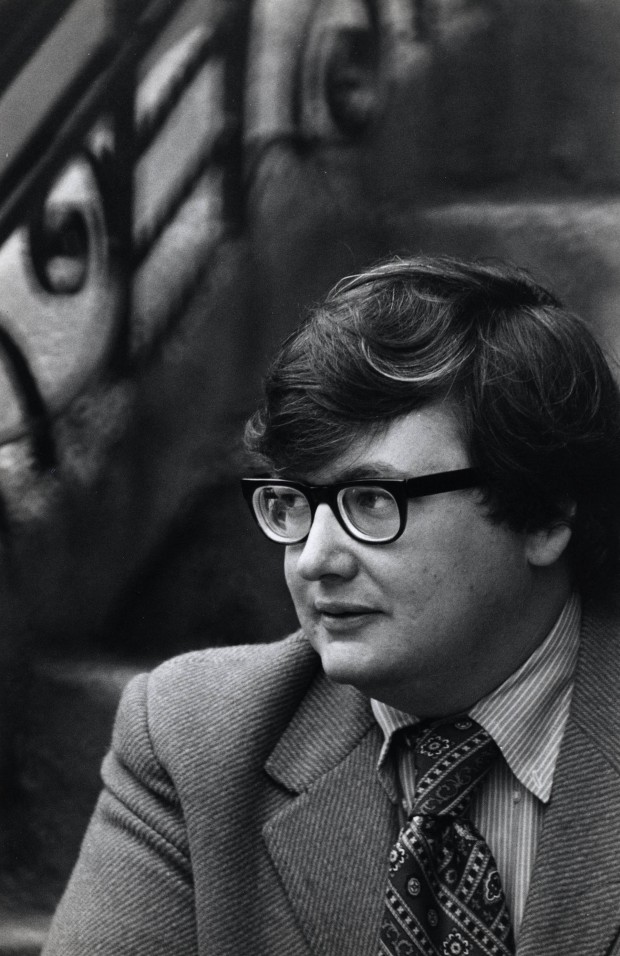 CNN Films also has rights to this movie. When are they going to show the movie?
CNN Films also has rights to this movie. When are they going to show the movie?
Yes, it’ll eventually be on CNN but it’s not going to be on either at the end of the year or the beginning of next year. It was always our intention, even when CNN came on early, that this film would be a theatrical film first and foremost. Because, number one, it’s about Roger and it’s about the movies, but number two — and you saw, in the press screening, it sounds like you had a bit of this experience — I’ve seen it a number of times with audiences. It’s a really wonderful viewing experience in the theater with other people, because of the humor and because of the poignancy. I’m not saying it’s Lawrence of Arabia.
Right.
But I think it’s a film that plays well in a communal setting with other people because it’s what Roger loved and so many people loved Roger.
Absolutely. When Ebert passed, you were already deep into making this movie. Is that correct?
He passed away four months into the making of the movie.
OK, so you hadn’t started editing or anything.
No, I actually begin editing right on the heels of his passing. We had done about two-thirds or more of the interviews at that point so I still had some to go. But I started right after he passed away. I sat down and started to carve out the movie the movie while I collected the remaining interviews.
For the structure, did you mostly use the memoir or did have your own ideas for the flow of it?
The memoir informed the movie in a lot of ways, including the idea of the structure, which was to sort of see life in the present and see it as a springboard in the past, because that’s what he does in the memoir. But the devil is in the details about how you go from one thing to another. That’s always a bit of a trial and error process, but I know, like the memoir, I wanted it to be largely chronological, but I didn’t want to be bound by the chronology because Roger’s life doesn’t fit that box so neatly. For 40 years he went to Cannes. For 40 years he want to the conference on world affairs. He devoted chapters to each of them. So I wanted the film to have that kind of feeling of when we deal with the conference or Cannes we just dive in and deal with it, even though it spanned his lifetime. I love the freedom of that, as someone who edits my own films, I loved the freedom of not, frankly, always being a slave to the narrative chronology of someone’s life.
Just wrapping up, Chaz Ebert has been such a champion of this film and it’s great to see her continue Roger’s legacy. Her strength and stamina must be such an integral part of this process. Can you talk about going on the press tour with her?
First of all, we couldn’t have made the movie without her. She was instrumental in everything that happened in order to get the film made and not just the filming of her and Roger, but access to archival sources and clips from shows. She was just phenomenal. Then, yes, it took several viewings of the film for her to finally really allow herself to watch the film that’s there. But she’s completely embraced it and like you said, she’s been an incredible trooper. She really likes the movie, loves the movie. I think she sees this movie as a part of Roger’s legacy and that’s very important to her.
That’s great. That’s all I have. Thank you so much for talking with me and best of luck with the film. It’s a great work.
Thank you very much. Take care.
Life Itself is now in limited release and available on VOD.

